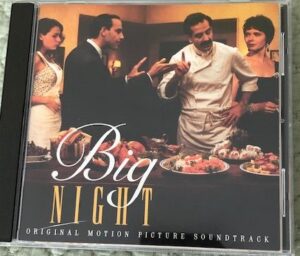There are few things that I anticipate more than getting The New Yorker each week and, when it was the “Food and Drink” Issue (September 6, 2021), I found myself reading, tasting and luxuriating all at once. This is “An Archival Issue” that cleverly reprinted exceptional articles from years past within its usual categories. “The Current Cinema” feature (September 23, 1996), titled “Feast and Famine” is a review by Terrence Rafferty of Big Night, one of my all-time favorite films.
Big Night (1996), directed by Campbell Scott and Stanley Tucci appears to be one of the many “Food Films” that have graced the big screen, from the iconic Babbette’s Feast (1987) to Julie and Julia (2009), all the way to The Lunchbox (2013), another favorite of mine. Rafferty’s review explores in great length the two protagonists’ acting style, Stanley Tucci and Tony Shalhoub, as Primo and Secondo, the two brothers who run Paradise, a small Italian restaurant at the Jersey Shore in the 1950s. This reviewer sees “The party scene as a fitting climax to the movie’s patient accumulation of savory and blissfully pointless delights.” This far I can agree, but if Mr. Rafferty had been a student in one of my film classes, I would have given him a big R (Re-write). How do I dare take down a New Yorker critic? Please bear with me and I’ll explain.
Not only does his review fail to mention the memorable sound-track with the original motion picture theme by Gary DeMichele and notable songs by Rosemary Clooney and Louis Prima among others, but it misses its theme completely. Big Night is much more than a food film; it is above all, an immigration story.
The real film’s climax is the denouement when Secondo cooks a simple omelet for Primo, who has decided to leave the United States and is going back to Italy that very morning. The long, slow, elaborate party scene contrasts profoundly with the simple, fast, goodbye breakfast. I remember seeing Big Night for the first time in the darkened theater and crying unconsolably during this sequence. Obviously, moved to tears thinking of the day when my older brother left for Madrid unexpectedly. After that my family never lived together as a family again. Many Americans tend to think that everyone wants to come and live in the States, but often it isn’t that way at all. Immigration breaks up families and creates big craters among those who stay in the foreign country and those who can’t come or go back as the Big Night brothers and my own sibling.
Since I have to make a research project of everything, I found The New York Times 1996 review of the film by Janet Maslin. At least she emphasizes the supporting roles of Isabella Rossellini, Ian Holm and Minnie Driver, although she puts the action in New York while it takes place in New Jersey. It’s ironic to see how Stanley Tucci, without hair now, has become a chef on a CNN series, in a similar foodie role, speaking basically the same few words in Italian as he did in Big Night twenty-five years ago. Another irony of times gone by is that a then unknown Marc Anthony played a minor role as the busboy before he became the Latin salsa sensation and Jennifer Lopez’s husband (and ex-husband). How is that for a time twist?


Dear Concha,
I’m so liking your columns and the tales they tell. Big Night and Tucci, Julie and Julia and Meryl Streep bring back fond film memories. We’ve put Big Night on our WS (watch soon) list. Linda remembers it well but I doubt I’ve seen it. We, too, are fans of Tucci’s current food adventures.
Your writings are engaging, well told tales. I also loved reading those Italian Market memories told with lively credibility!
Thanks for sending on these literate memories.
Much love,
Virginia
(Virginia is my “consuegra.” A word that doesn’t exist in English, maybe because the relationship doesn’t exist. It means something like “co-in-laws ,” the relationship with our children’s in-laws. Interesting that there is a word in Yiddish: “machatunim.”)
I read your insightful review of the film “Big Night”; it is so well written and certainly makes a good point that the content is more than a romp with food. As we know, cuisine often reveals a story, particularly the familial roots of the cook…kind of “we are more than just what we eat”.
Your review certainly has spurred me to see the film,; it seems like it’ll make an enjoyable cinema night.
BTW I was delighted to get your blog referral from my friend Ross.
So glad to have you on board, Charlotte, welcome! Any friend of Ross’ is a friend of mine.
Hi Concha,
My comment is off topic. What do you think of Carmen Mola and the forthcoming La Bestia?
Apparently, the author is three men!
https://www.nytimes.com/2021/10/29/world/europe/spanish-writer-carmen-mola-true-identity.html
James Horner
(sent here by Ross)
I haven’t read “Carmen Mola.” But I think it’s ironic that it took three men to write as one woman. Since women make up most of the readers in Spain, particularly of literature written by women, it’s obvious that the three impostors wanted to profit in an economic sense. Glad to know that they will have to split in three the lucrative Planeta Prize.